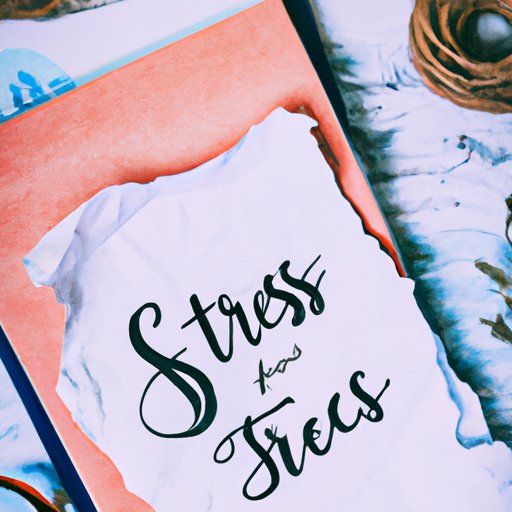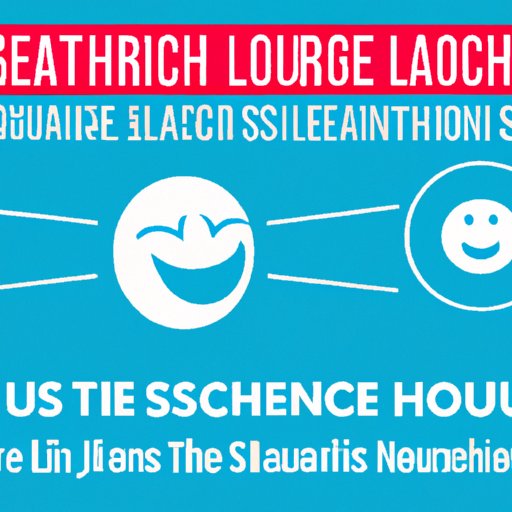
Introduction
Stress is a common problem that affects many people in their daily lives. Whether it’s work-related stress, personal problems, or health issues, stress can greatly affect our mental and physical well-being. It is essential to find ways to manage stress to improve our overall quality of life. In this article, we will explore several effective tips and techniques that can help you destress quickly and easily.
7 Simple Ways to Destress in 5 Minutes or Less
It’s essential to take a break and destress, especially on busy days. Here are seven simple ways to destress in five minutes or less:
1. Deep Breathing
Deep breathing is a simple and effective way to destress quickly. Take a deep breath, holding it for a few seconds, and then exhale slowly. Repeat the process three to four times, and you will start to feel more relaxed.
2. Listening to Calming Music
Listening to calming music can help you reduce stress and anxiety. Choose your favorite song or create a playlist of relaxing music. Sit back, close your eyes, and enjoy the peaceful tunes.
3. Progressive Muscle Relaxation
Progressive muscle relaxation is a technique where you tense and then relax your muscles. Find a quiet place, sit comfortably, and concentrate on your muscles. Start by tensing your toes and hold for a few seconds, then relax. Move your way up your body, tensing and then relaxing each muscle.
4. Visualization
Visualization is a technique where you imagine a peaceful place or moment. Close your eyes and imagine yourself in a beautiful and calm environment, such as a beach or a forest. Try to engage all your senses and stay in this peaceful state for a few minutes.
5. Aromatherapy
Aromatherapy is the use of essential oils to improve your mood and reduce stress. Apply a few drops of lavender oil or any other relaxing scent to your wrists, neck, or temples. Inhale deeply and enjoy the calming effects of aromatherapy.
6. Taking a Walk
Taking a walk can help you clear your mind and reduce stress. Go for a short walk around the block, focusing on your breathing and the environment around you. Enjoy the fresh air and take a break from your daily routine.
7. Drinking Tea
Drinking tea is another way to reduce stress and promote relaxation. Choose a caffeine-free herbal tea such as chamomile, lavender, or peppermint. Sip slowly, focusing on the warmth and taste of the tea.
The Art of Letting Go: How to Destress and Find Peace
Letting go of stress is an essential part of destressing. Here are some tips on how to let go of stress:
1. Identifying and Accepting What You Cannot Control
One of the main reasons for stress is trying to control things that are beyond our control. Focus on things that you can control, such as your reactions and behavior. Accept the things you cannot control and let go of them.
2. Reframing Negative Thoughts into Positive Ones
Negative thoughts can increase stress and anxiety. Try to reframe negative thoughts into positive ones. Look for the good in every situation and focus on positive aspects of your life.
3. Practicing Gratitude
Gratitude is the practice of being thankful for what you have. Take a moment to focus on the positive aspects of your life and express gratitude. Write down three things you are thankful for each day to cultivate a grateful attitude.
4. Engaging in Self-Care
Self-care is essential for reducing stress and improving your well-being. Take care of yourself physically, emotionally, and mentally. Exercise regularly, eat healthy, get enough sleep, and take time for yourself.
Box Breathing, Yoga and More: Effective Techniques to Destress Your Mind and Body
Certain activities can help you reduce stress and anxiety. Here are some effective techniques to try:
1. Box Breathing
Box breathing is a technique where you take slow and deep breaths. Inhale for four seconds, hold for four seconds, exhale for four seconds, and hold for four seconds. Repeat the process for a few minutes and notice how relaxed you feel.
2. Yoga
Yoga is a physical practice that combines movement and mindfulness. Practicing yoga regularly can help you reduce stress and improve your well-being. Attend a yoga class or follow an online yoga video.
3. Tai Chi
Tai chi is a form of martial arts that focuses on breathing and slow movements. Practicing Tai Chi can help reduce stress and improve balance and flexibility.
4. Acupuncture
Acupuncture is an alternative therapy that involves inserting thin needles into specific points on your body. It can help you reduce stress and promote relaxation.
5. Meditation
Meditation is a practice that involves sitting quietly and focusing your mind. Practicing meditation regularly can help you reduce stress and anxiety and improve mental clarity.
Digital Detox: Tips and Tricks to Reduce Stress and Anxiety from Technology
Technology can have negative effects on our well-being, such as increased stress and anxiety. Here are some tips on how to unplug and disconnect from technology:
1. Taking a Break from Social Media
Social media can be a source of stress and anxiety. Take a break from social media, delete unnecessary apps from your phone, and limit your screen time.
2. Setting Boundaries with Technology
Set boundaries with technology, such as not checking your phone during meals or when spending time with friends and family. Create tech-free zones in your home, such as your bedroom.
3. Using Screen Limit Apps
Screen limit apps can help you control the amount of time you spend on your phone or other devices. Install a screen limit app on your phone or computer to help you manage your time more effectively.
4. Engaging in Non-Digital Activities
Engage in non-digital activities, such as reading a book, painting, or going for a walk. Find activities that bring you joy and help you reduce stress without the use of technology.
The Healing Power of Nature: Outdoor Activities to Destress and Recharge
Nature is an excellent source of stress relief. Try these outdoor activities to destress and recharge:
1. Hiking
Hiking is a great way to enjoy nature and get some exercise. Find a local hiking trail, put on your walking shoes, and enjoy the fresh air and beautiful scenery.
2. Gardening
Gardening is an excellent way to connect with nature and reduce stress. Plant some flowers, vegetables, or herbs and enjoy the therapeutic benefits of gardening.
3. Camping
Camping is an excellent way to unplug and destress. Spend a few days in nature and enjoy the beauty of the outdoors. Build a campfire, go fishing, or simply relax and enjoy the peace and quiet.
4. Walking on the Beach
Walking on the beach can help you reduce stress and connect with the natural world. Take a walk on the beach and enjoy the soothing sounds of the waves and the beauty of the coastline.

The Science of Laughter: How Humor and Play Can Help You Destress and Boost Your Mood
Humor and play can be effective in reducing stress and boosting your mood. Here are some examples of how to add more humor and play into your life:
1. Watching a Funny Movie
Watching a funny movie can help you reduce stress and lighten your mood. Choose your favorite comedy and enjoy a good laugh.
2. Playing with a Pet
Playing with a pet can help you reduce stress and promote relaxation. Spend time with your furry friend, play fetch or go for a walk together.
3. Participating in a Game Night
Participating in a game night with friends or family can help you reduce stress and enjoy yourself. Choose your favorite game and enjoy some friendly competition.
4. Telling Jokes
Telling jokes can help you reduce stress and promote laughter. Share your favorite jokes with friends, family, or co-workers and enjoy some good-natured humor.
Mindfulness Made Easy: Quick and Simple Tools to Destress and Improve Mental Clarity
Mindfulness is the practice of being present in the moment and fully engaged in what you are doing. Here are some quick and simple tools to practice mindfulness:
1. Mindful Breathing
Mindful breathing is a technique where you focus on your breath. Sit in a quiet place and focus on your breath, feeling the air flowing in and out of your body.
2. Body Scan
Body scan is a meditation technique where you focus on each part of your body. Sit or lie down in a comfortable position, and focus on each part of your body, starting from your toes and moving up to your head.
3. Guided Meditation
Guided meditation is a technique where you follow a meditation guide’s instructions. Find a guided meditation online or attend a meditation class.
4. Mindful Eating
Mindful eating is a technique where you focus on each bite of food. Pay attention to the taste, texture, and scent of the food, and take your time eating.
Conclusion
Stress is a common problem that affects many people in their daily lives. This article has explored several effective tips and techniques to help you destress quickly and easily. Whether it’s deep breathing, yoga, or simply taking a walk, incorporating these techniques into your daily routine can help reduce stress and improve your well-being. Remember to take care of yourself physically, mentally, and emotionally, and don’t hesitate to seek professional help if you’re struggling with stress. Take the first step towards a stress-free life today.





